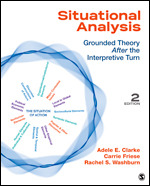Situational Analysis
Grounded Theory After the Interpretive Turn
- Adele E. Clarke
- Carrie Friese - London School of Economics, UK
- Rachel S. Washburn - Loyola Marymount University, USA
Qualitative Research (General) | Social Research Methods | Sociological Research Methods
Supplements
Open access resources at study.sagepub.com/clarke2e help you further engage with Situational Analysis. Materials include:
- The epilogue, “FAQs and Conversations” from the first edition
- Relevant SAGE Journal articles from across disciplines, organized by mapping emphasis
- Exemplars of Situational Analysis projects
- Downloadable templates for use in the field
- Tips for teaching and learning Situational Analysis
- Video and multimedia resources to assist with further explorations of topics
- Appendices from the book for quick reference
- The reference list from the text and a list of additional publications by the authors to aid in continuing research
“The book is a milestone in the development of qualitative research. It shows comprehensively and convincingly how pragmatism and post-structuralism can be used to analyze the complexity of our contemporary condition.”
“This updated text has moved the field further along in its understanding of not just the theoretical underpinning of SA, but the practical steps of how to use it well. Anyone wanting to know how to construct a sound SA research design must read this book.”
“Relentlessly empirical and fiercely situated, the second edition is dense, refreshing, and conversational. It invites readers to practice the art of Situational Analysis and extends the reach, relevance, and versatility of the conceptual methodology.”
“The new edition captures the substance and the excitement of Situational Analysis and its relation to other developments in social science, provides well-elaborated examples to make the methods concrete, and points to questions of theory that invite career-length exploration.”
“Imagine a conceptual methodology textbook that serves as coach, mentor, and cheerleader for Situational Analysis. The second edition supports and facilitates constant reflection while you are researching, analyzing, and writing. It will motivate many fine projects in the years to come.”
“Situational Analysis helps researchers critically and constructively map the complexities of today's diverse and often contested aspects of human and technological interaction. Use of this second edition of Situational Analysis will enable further ideas and dialogues to address postmodern dilemmas.”
“This extensively updated edition puts qualitative data analysis in the grounded theory tradition on the map, literally and figuratively.”
“The present book is a powerful revision of Situational Analysis. Adele E. Clarke and her co-authors succeed all through this 'theory-methods package' in combining older and newest theory and methodology in social inquiry beyond jargon, with a carefully elaborated introduction into the practice of doing SA analysis. The authors so much know and live what they are writing about – this is the book's core feeling from start to end.”
“I have been teaching Situational Analysis to my graduate and post-graduate students based on the first edition of Clarke’s book for some years. The students have appreciated her direct and hands-on approach to studying complex and intricate empirical issues. I very much look forward to use this second edition of Situational Analysis in my courses. It will offer the students even more guidance for their studies. It has a unique blend of theoretical depth and practical applicability that speaks directly to students and scholars who want engage with empirical complexities.”
This book presents a clear, accessible but in depth overview of Situational Analysis. The authors set out the history and foundations of situational analysis before addressing 'how to do' situational analysis. This comprehensive overview is relevant to all researchers, from those who are new to methods of analysis, those in the design phase of their project or those researchers who seek an alternative method of qualitative analysis.
Sample Materials & Chapters
Chapter 1: Situational Analysis: Grounded Theory After the Interpretive Turn



